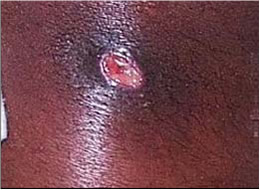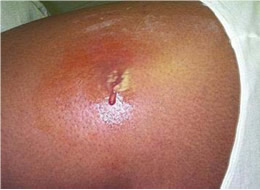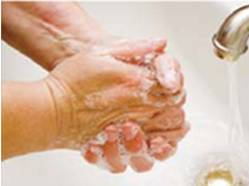MRSA stands for Methicillin-Resistant Staphylococcus aureus. MRSA is a bacteria. While Staphylococcus aureus is commonly found on the skin or in noses of healthy people without causing infection, MRSA is a type of staph that is resistant to antibiotics making it more difficult to treat.
MRSA is a common cause of minor skin infections, but can also cause more serious infections (such as pneumonia, boodstream infections, and surgical wound infections. The more serious infections may require hospitalization, especially in people with weakened immune systems.
Where Does MRSA Come From?
MRSA infections are found in the community (generally, where there are crowds of people), as well as in healthcare settings. Over the years the bacteria has become more resistant to antibiotics. Resistant means the bacteria can no longer be killed by common antibiotics.
What Do MRSA Infections Look Like?
Skin infections may be mistaken for a “spider bite.” The infected area is often red, swollen and painful to touch. Pus may drain from the infected area.
What Is MRSA Colonization?
Colonization means that MRSA is present on or in the body without causing infection or an illness. People who are either colonized or infected can spread MRSA to other people. MRSA infection may spread to other areas of the body.
How Is MRSA Spread?
- By not washing your hands frequently!
- By touching someone with a MRSA infection and not washing your hands.
- By touching anything contaminated with MRSA and not washing your hands.
Can I get MRSA from someone at work?
MRSA is transmitted most frequently by direct skin-to-skin contact or contact with shared items or surfaces that have come into contact with someone else’s infection (e.g., towels, used bandages).
What Should You Do If You Think You May Have MRSA?
The only way to be certain is to consult with a doctor. A doctor will determine the best type of treatment.
What You Can Do To Stop The Spread Of MRSA?
- Keep your hands clean by washing thoroughly and frequently.
- Keep cuts clean and covered with a proper dressing or bandage until they are healed.
- Avoid contact with other people’s wounds or anything contaminated by a wound.
- Avoid sharing personal items such as razors, towels, toothbrushes, water bottles and sports equipment that directly touches your body.
- Clean objects such as gym and sports equipment before and after use.
- Shower with soap and water immediately after participating in sports or working out in a gym.
- Wash dirty clothes, linens and towels with hot water and laundry detergent.
- Dry clothes in a hot dryer, rather than air-drying them.
- Do not demand antibiotics from your doctor.
- Take ALL antibiotics as prescribed.
- Do not share antibiotics with anyone else.
Are You Visiting Someone In The Hospital?
Hospitals and healthcare facilities care for many patients who can easily catch an infection. When visiting a relative or friend in the hospital, there are many things you can do to help prevent the spread of infections.
- Do not visit if you are not feeling well or are sick with: fever, cold, cough, rash, body aches, sore throat, diarrhea or are throwing up.
- Always wash your hands before eating and after using the bathroom.
- Follow the visiting hours.
- Limit the numbers of visitors.
- Wash hands or use hand sanitizer before and after entering the patient’s room or place of care.
- Wear clean clothes.
- Do not sit on the patient’s bed.
- Avoid using the patient’s toilet.
- Before bringing gifts, food and other personal items, ask what is allowed. Some patient care units may not allow flowers/plants/fresh fruits and others may prefer you not bring in food.
- Avoid adding to clutter in the patient’s room which makes cleaning the patient’s room/area difficult.
- Talk to the patient’s nurse if you have concerns about the cleanliness of the room.
- Do not touch the patient’s wound(s), devices or any hospital equipment in the room.
- If you are worried or have any questions, speak with your relative’s/friend’s nurse.
The National Institute for Occupational Safety and Health (NIOSH) offers a new web resource to help employers and workers address workplace concerns associated with Methicillin-resistant Staphylococcus aureus (MRSA).
The new topic page at www.cdc.gov/niosh/topics/mrsa/ discusses the ways in which the MRSA bacteria can be spread at work, and recommends practical health steps to prevent transmissions from occurring. These steps include, among others:
- Providing and using adequate facilities and supplies at work to promote hand-washing and other good hygiene practices.
- Appropriate cleaning of equipment and surfaces in the event of contamination.
- Recommended precautions for individuals to follow if they have a MRSA infection or an infected wound: Cover and take care of a wound as directed by a health care provider. Clean your hands. Avoid sharing personal items. Ask your health care provider before returning to work. (MRSA is transmitted most frequently by skin-to-skin contact or contact with shared items or surfaces that have come into contact with someone else’s infection.)
Other Resources Available:


